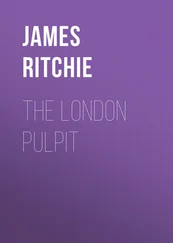James Ritchie - The Religious Life of London
Здесь есть возможность читать онлайн «James Ritchie - The Religious Life of London» — ознакомительный отрывок электронной книги совершенно бесплатно, а после прочтения отрывка купить полную версию. В некоторых случаях можно слушать аудио, скачать через торрент в формате fb2 и присутствует краткое содержание. Жанр: foreign_prose, на английском языке. Описание произведения, (предисловие) а так же отзывы посетителей доступны на портале библиотеки ЛибКат.
- Название:The Religious Life of London
- Автор:
- Жанр:
- Год:неизвестен
- ISBN:нет данных
- Рейтинг книги:3 / 5. Голосов: 1
-
Избранное:Добавить в избранное
- Отзывы:
-
Ваша оценка:
- 60
- 1
- 2
- 3
- 4
- 5
The Religious Life of London: краткое содержание, описание и аннотация
Предлагаем к чтению аннотацию, описание, краткое содержание или предисловие (зависит от того, что написал сам автор книги «The Religious Life of London»). Если вы не нашли необходимую информацию о книге — напишите в комментариях, мы постараемся отыскать её.
The Religious Life of London — читать онлайн ознакомительный отрывок
Ниже представлен текст книги, разбитый по страницам. Система сохранения места последней прочитанной страницы, позволяет с удобством читать онлайн бесплатно книгу «The Religious Life of London», без необходимости каждый раз заново искать на чём Вы остановились. Поставьте закладку, и сможете в любой момент перейти на страницу, на которой закончили чтение.
Интервал:
Закладка:
Yet, after all, there is a danger. If rationalist principles prevail, and the Old Testament be a series of myths or allegories, why still retain the ritualist law in all its strictness? and if that goes the whole system goes. Pious Jews find all society against them; its spirit, its customs, its literature, all hostile, if not to their nation, at any rate to their faith. In too many cases they perceive that those who forsake the religion of their forefathers are but little the better for doing so. They find that those who begin by laughing at rabbinical absurdities end by despising the Word of God. A Hebrew infidel, an infidel among the Israelites, to whom pertaineth the adoption and the glory and the covenants, writes a Jewish author already quoted, “is indeed a frightful and portentous phenomenon,” and thus the more sensitive and conservative amongst them shrink from in any way modifying their ritual in accordance with what is termed the spirit of the age. Christians have no idea of the earnestness of spirit, of the striving after conformity to the law of God, of the devout Jew, or of the great and grand truths which he extracts from observances or forms in which they can see no meaning. The Jew is fond of pleasure, fond of show, fond of jewellery and gorgeous dress, and on his Sabbath rarely exhibits a very devout appearance; nevertheless his religion requires daily observances from his birth upwards, which can only be carried out by means of a living faith. In the first place his religion is an expensive one, and he must pay in various ways very heavily for its support. It is true many of the observances required have become obsolete, but on the Sabbath he has much to go through at home, as well as to attend at the synagogue and to abstain from all worldly occupations. After the third day of the month every strict Jew either alone or with a number of his co-religionists must make the salutation of the moon. Then every month has certain days to be kept, especially in October, their new year, on the first and second days. It is believed that the destiny of every individual is determined on this month by the Creator Himself; that those whose demerits preponderate are sealed to death, those whose merits preponderate to life, and those whose merits and demerits are equal are delayed until the day of atonement. The first ten days of their new year are ten days of repentance, during which the Israelites are to repent and confess their sins, pray to the Almighty to write them down in the book of life, and grant them a happy new year. On the seventh day every one has a branch of willow procured under the superintendence of the officers of the synagogue, and all repair there with branches in their hands. The last of these days is the Day of Atonement, and is religiously kept by every Jew. On the 15th is the Feast of Tabernacles, on which the Jews are expected to live in booths, but in this country the rule is not strictly observed. In April is the most important of all the festivals – that of the Passover and of unleavened bread, when the doors of the house are left open for all, even the very poorest of the poor. In June is held the feast of Pentecost, to commemorate the giving of the law. The synagogues on that occasion are decorated with flowers, and in their houses the tables and floors are also dressed with flowers, sweet briar, and other fragrant herbs. A conscientious Jew must have a life of intense labour and self-denial, nor can he evade his duties nor impose them on another. How welcome to them of old must have been the Master’s kindly words, “Come unto Me all ye that are weary and heavy-laden, and I will give you rest. Take My yoke upon you, and learn of Me, and ye shall find peace unto your souls. For My yoke is easy and My burden is light.” To appreciate these words aright you must fancy yourself a Jew, weighed down to the earth by the daily routine of painful ceremonial and the rigid requirements of inelastic law.
CHAPTER IV.
the greek church
In the dark ages of Christianity, when the zeal and purity of the early professors and martyrs of the new creed had died away; when Constantine, anxious to fix his throne on a permanent basis, entered into an alliance with priests and bishops, not satisfied with the humble position assigned them in the Church, only by courtesy at that time to be called Apostolical; there was a revival of an old abuse, or rather, of a Pagan principle – the alliance of Church and State. Dr. Arnold, the truest Churchman in modern times, believed that the national conversions to Christianity, which then became the fashion, were productive of immense evil. This is the opinion long held by Dissenters, and latterly by an increasing number of independent inquirers. If so, Constantine was an arch-heretic; for surely, when Christ had taught that His kingdom was not of this world, it was heresy to disbelieve it, and, in the very teeth of such a declaration, to introduce an ecclesiastical system founded upon compulsion, ignoring altogether the Divine power of Christianity, and assuming that it could only be maintained by the sword and pay of the State.
Constantine’s empire has vanished, but his Church remains; and it speaks to us, as Dean Stanley says, in the only living voice which has come down to us from the Apostolic Church: the State Churches of Europe, including even the pretentious one at Rome, are but its children. It is the pattern and model for them all. Greek was the original tongue of the early Christians. It was at Antioch, a Greek city, the birthplace of Ignatius, of Chrysostom, of John of Damascus, that they were first called by the name which now denotes the noblest form of human development. In the Old World or the New, the Councils to which Churchmen in all ages have referred, as of equal, or almost of equal, authority with the Bible, were Eastern. In them the Pope of Rome was considered but as a Bishop in the midst of his equals. The great fathers of the Church wrote in Greek. Dean Stanley says, the earliest fathers of the Western Church, Clemens, Irenæus, Hermas, Hippolytus, did the same. St. Mark first preached his Gospel at Alexandria. St. John established a school at Ephesus, and Polycarp at Smyrna. The very word theology, as Dean Stanley remarks, arose from the peculiar questions agitated in the East. If there be such a thing as apostolical succession, the Greek Church has it. To this day, the English Church owes much to the East; the direction for holding of Easter is of Alexandrian origin, and on every Sunday, in the “Kyrie Eleison,” the “Gloria in Excelsis,” in part of the “Te Deum,” and the prayer of St. Chrysostom, English Churchmen borrow from the service of the Church of Constantine. In Queen Elizabeth’s time it was enacted that the Councils of Nicæa, Constantinople, Ephesus, and Chalcedon were equally judges of heresy as the High Court of Parliament with the assent of the English clergy in their Convocation. No wonder, in these days, when Churchmen are prone to rely on Church claims rather than on Bible teaching – when, of little faith, and timid as to the future, they trust rather to hazy traditions than to living truths – no wonder the Greek Church has become to them an object of special reverence; that they long to form a union with it. Though proud of its superiority, it regards them as little better than Roman Catholics – Roman Catholics as a Greek once said to the writer, without the Pope.
The oldest creed we have is Greek. The pious forgeries of our Church historians are enough to make a candid inquirer a thorough sceptic as to all they say; but we may still give some credit to Eusebius of Cæsarea, the father of ecclesiastical history. He tells us he read his creed before the Council of Nicæa. It was the same, he said, that he had learnt in his childhood from his predecessors, during the time that he was a catechumen, and at his baptism; and which he had taught for many years as a presbyter and bishop. It had been approved of by the Emperor Constantine, and would have been carried had not there appeared a probability of its being accepted by Arius and his partisans – a consummation which, in the opinion of the majority, would have had a disastrous effect, would have promoted union, would have saved many from the sin of schism, would have allowed the energies of the Church to have been directed to the conversion of the world rather than to internal squabbles, would have relieved Constantine from the stain and guilt and shame of having recourse to the sword to repress religious opinion. The Council of Nicæa cared for none of these things; all they wanted was victory, and so the earliest Christian creed was rejected by the Church. It was as follows: —
Читать дальшеИнтервал:
Закладка:
Похожие книги на «The Religious Life of London»
Представляем Вашему вниманию похожие книги на «The Religious Life of London» списком для выбора. Мы отобрали схожую по названию и смыслу литературу в надежде предоставить читателям больше вариантов отыскать новые, интересные, ещё непрочитанные произведения.
Обсуждение, отзывы о книге «The Religious Life of London» и просто собственные мнения читателей. Оставьте ваши комментарии, напишите, что Вы думаете о произведении, его смысле или главных героях. Укажите что конкретно понравилось, а что нет, и почему Вы так считаете.












